Rainwater Harvesting Facilities for improved urban resilience to flooding in Greater Kampala
Kampala city, Uganda’s capital, is experiencing recurring flash floods. One reason for this is the rapid urbanization which has led to an increase in impervious surfaces. This in turn results in accelerated runoff water, which the existing drainage system can no longer cope with. The often devastating flash floods represent a constant threat to human life and the city’s economy.
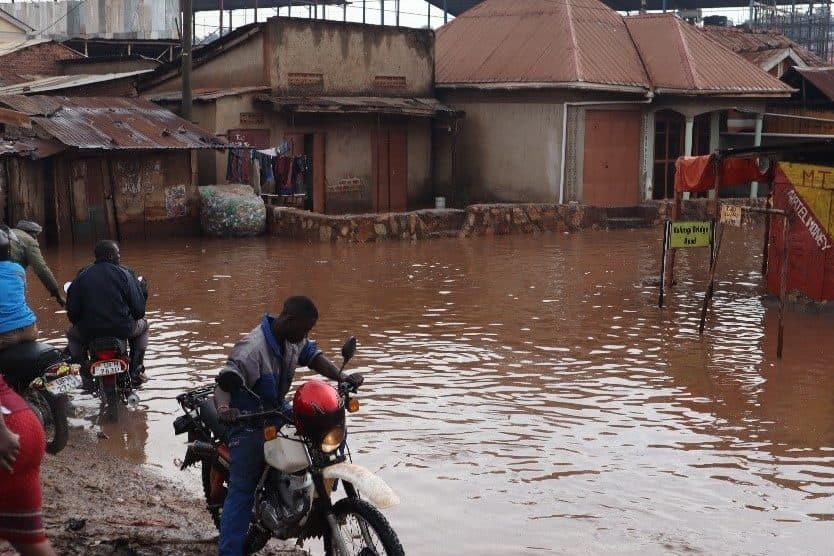
Flooding in Nalukolongo, part of the Greater Kampala Metropolitan Area.
A Partnership to Promote Joint Solutions: Blue-Green Infrastructure
To increase flood resilience, stakeholders from the public sector, private companies and civil society formed the Greater Kampala Integrated Flood Resilience Partnership in 2021. Partners include the Ministry of Water and Environment, Kampala Capital City Authority, Uganda Manufacturers Association, Britannia Industries Ltd., and the local NGO ACTogether.
One of the partnership’s goals is to promote investments in blue-green infrastructure solutions in two areas of Kampala, namely Nalukolongo and Kinawataka. Blue-green infrastructure means utilising the benefits of urban green spaces and naturalised water-flows. Examples include green roofs, retention ponds, bioswales, rain gardens and rainwater harvesting systems.
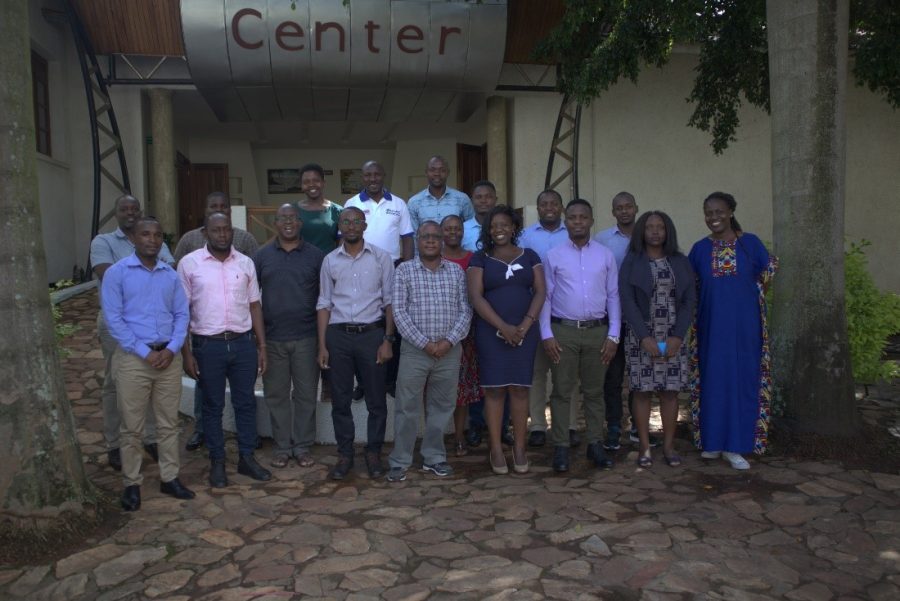
Partners of the GKIFR partnership during a partnership retreat.
Rainwater harvesting as impactful measure against floods
One of the blue-green interventions identified under the partnership is scaling up rainwater harvesting, to reduce pressure on the existing stormwater drainage infrastructure in Kampala. Rainwater harvesting entails capturing runoff from the roof of a building or from open spaces and channelling it into storage structures. These structures are above or below ground for reuse or slow release. The harvested water can be used for cleaning, washing, irrigation, or as process water.
Partners have identified seven public sites where rainwater harvesting is piloted. This should motivate other stakeholders to follow suit and achieve an impactful large-scale investments. Selected sites include: Kitebi Primary School, Lubiri Secondary School, Kitebi Secondary School, Nakawa Market, Usafi Market, Nateete Market, and Kampala City Abattoir.
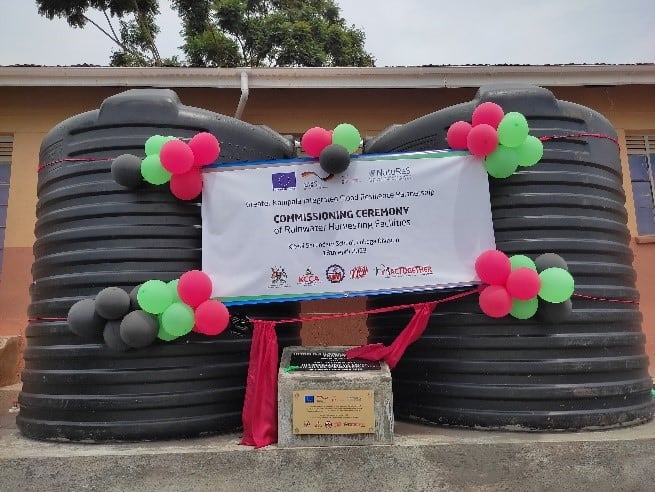
Two of the eight constructed rainwater harvesting tanks at Kitebi Secondary School
Launching rainwater harvesting facilities
With most of the construction completed, partners, spearheaded by Kampala Capital City Authority (KCCA), officially commissioned the facilities on 18th of April 2023 at Kitebi Secondary School in Lubaga Division, Nalukolongo. The event was presided by the Executive Director of KCCA, Mrs. Dorothy Kisaka, and the Team Leader of the European Union, Mr. Lennart Deridder. Several invited guests and dignitaries attended, including the Permanent Secretary at the Ministry of Education and Sports, the Resident City Commissioner for Kampala, the Mayor for Lubaga Division, as well as the KCCA Directors for Public Health and Education services. Next to partnership members of the Greater Kampala Integrated Flood Resilience Partnership, board of governors for Kitebi Secondary school, management and staff of Kitebi secondary and primary schools, as well as local community leaders participated. Finally, the GIZ Head of Global Programs, Dr. Elke Siehl, assisted the ceremony.
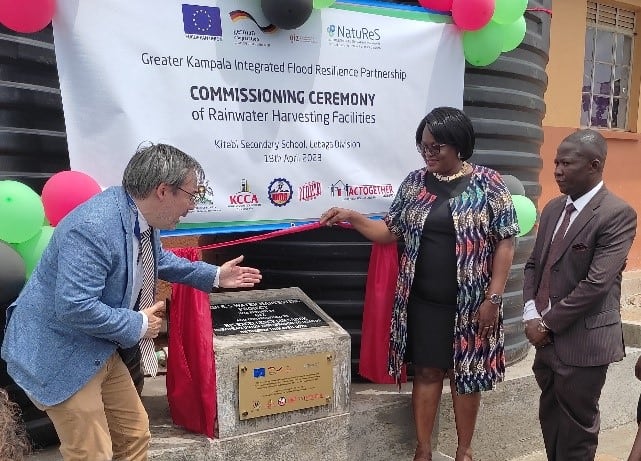
The Team Leader EU and Executive Director of KCCA officially commissioning the rainwater harvesting facilities at Kitebi Secondary School in the presence of the school Headmaster.
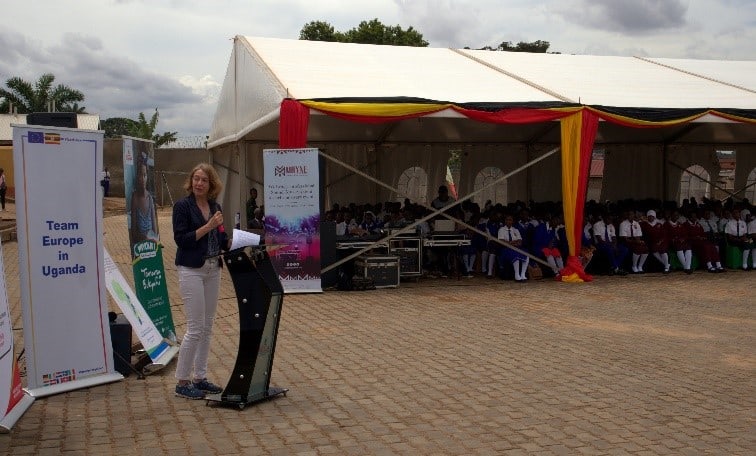
The GIZ Head of Global Programs addressing the attendees during the commissioning ceremony.
Flood resilience is essential part of a prosperous city
During the commissioning ceremony, KCCA Executive Director Dorothy Kisaka emphasized that flood resilience is one of the key elements of an inclusive, resilient, and well-planned city that provides economic opportunities for all. She also stated that rainwater harvesting should be implemented at all large public buildings, such as schools, shopping malls, and markets.
At Kitebi Secondary School, eight rainwater harvesting tanks were constructed with a capacity of 10.000 litres each. Through this support, the water needs of over 4.000 students will be covered and the risk of flooding in the area will be reduced. Furthermore, through landscaping, the uneven, rocky compound next to the school was turned into an even football pitch to enhance stormwater infiltration. The other six identified sites received four to five rainwater harvesting tanks with a capacity of 10.000 litres each. At Kitebi Primary School, additional re-greening and landscaping interventions reduce the risk of flooding.
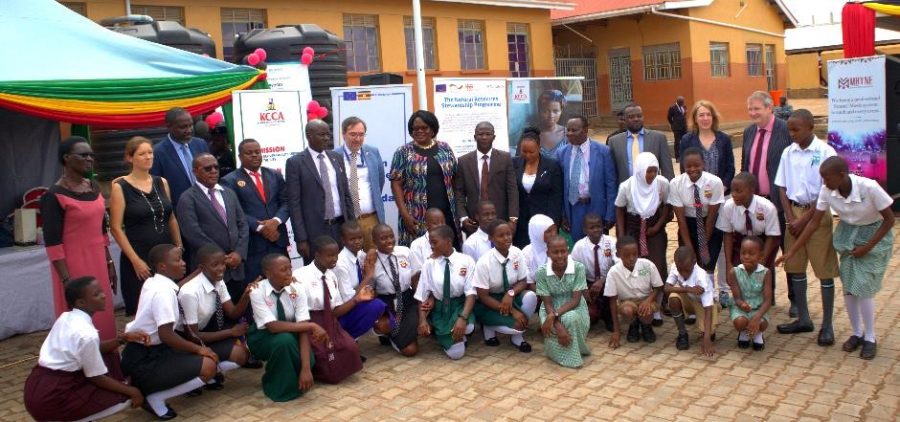
Group photo of invited guests and dignitaries, as well as pupils of Kitebi Secondary School, during the rainwater harvesting commissioning ceremony.
Through collaborative action under the partnership, blue-green infrastructure solutions, such as rainwater harvesting facilities, have been emphasized as an essential step towards a more sustainable and flood resilient future for the Greater Kampala Metropolitan Area.